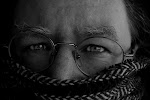I was following the #G20 hash on Twitter in order, like the UK police, to keep abreast of the latest developments concerning the G20 summit protests in London when I came across a short documentary, Press Freedom: Collateral Damage which shows the increasingly systematic harassment of camera operators, photographers and journalists by the police in Britain. As the National Union of Journalists site says;
"The NUJ had already submitted written evidence to the committee’s Policing and Protest inquiry. In his oral evidence, Jeremy highlighted issues such as journalists being denied access to report on demonstrations, the removal and deletion of data and the excessive use of stop and search powers against journalists.
He also highlighted some of the violent consequences faced by journalists going about their work, including details of past physical assaults.
The committee went on to question Jeremy about the surveillance of journalists by the police’s Forward Intelligence Team, which was set up to monitor the activities of people under suspicion of criminal activities."
I remember talking with a reporter here in Thessaloniki and they told me the same kind of thing; that the police have been becoming more aggressive in there treatment of photographers and people with video cameras.
I suppose that this is another spin - off connected with the rise of the internet and the ability of people to post their own stories to a wider audiences. In the past only a few could get their news out, usually via the mainstream press. As a result there were ways of making sure that potentially embarrassing images of police misbehavior could be quietly surpressed with an appeal to the editor/owner's sense of civic duty combined with veiled threats concerning the possible difficulties their journalist could face getting access to police sources in the future. Nowadays, however, such obstacles can be easily circumvented by posting such material on a site which means that everyone carrying a camera maybe a potential "enemy".
In addition the rise of citizen journalism means that many of those who cover demos, protests and the like are not subject to the traditional rules of engagement that covered reporters in the past and so unburdened by a political line set down by the channel/paper/station are free to report what they see.

No comments:
Post a Comment